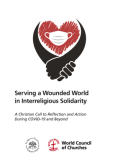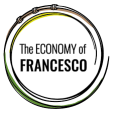“Serving a Wounded World in Interreligious Solidarity: A Christian Call to Reflection and Action During COVID-19 and Beyond”
The World Council of Churches (WCC) and the Pontifical Council for Interreligious Dialogue (PCID) released a joint document, “Serving a Wounded World in Interreligious Solidarity: A Christian Call to Reflection and Action During COVID-19.” Its purpose is to encourage churches and Christian organizations to reflect on the importance of interreligious solidarity in a world wounded by the COVID-19 pandemic. The document offers a Christian basis for interreligious solidarity that can inspire and confirm the impulse to serve a world wounded not only by COVID-19 but also by many other wounds.
Pope Francis: We cannot go back to old ways after the pandemic
Preamble
What does it mean for Christians to love and serve our fellow human beings in a world in which the COVID-19 pandemic has inflicted widespread suffering? At a timesuch as this, the World Council of Churches (WCC) and the Pontifical Council for Inter-religious Dialogue (PCID) call upon the followers of Jesus Christ to love and serve our neighbours. We focus on the importance of doing so in solidarity also with those who profess and practice religions that are different from our own or consider themselves unaffiliated to any particular faith tradition.
This document aims to offer a Christian basis for interreligious sol-idarity that can inspire and confirm, in Christians of all churches, the impulse to serve a world wounded not only by the COVID-19 pandemic but also by many other wounds. While primarily intended to address Christians, we hope that it will be useful also to those of other religions, who have already responded to this cri-sis with similar thoughts based on their own traditions. The global challenge of responding to this pandemic calls us to increased ecu-menical and interreligious awareness and cooperation.
Recommendations
We call upon all Christians to serve our neighbours, and to serve alongside them, taking into consideration the recommendations below.
1.Find ways of bearing witness to suffering, drawing attentionto it, and challenging any forces that aim to silence or excludethe voice of the wounded and vulnerable among us, holdingaccountable the people and structures behind this suffering.
2.Promote a culture of inclusivism which celebrates differenceas God’s gift,to counter all signs of exclusivism we see today inour societies at various levels. This needs to begin within familylife and continue through other social institutions. To this end,we recommend the responsible use of social media to enhancehealthy and constructive communication, to amplify the mes-sage of peace and solidarity.
3.Nurture solidarity through spirituality,considering how tradi-tional spiritual practices such as prayer, fasting, self-denial andalmsgiving can be more deeply infused with an awareness ofthe needs of the wider world and of our call to be in solidaritywith the suffering.
4.Widen the formation of clergy, members of religious commu-nities and orders (both men and women), laity, pastoral work-ers, and students to foster empathy and to equip them with the best knowledgeand the tools to work for a wounded humanity in cooperation with others.
5.Engage and support young people, whoseidealism and energycan be an antidote to the temptation of cynicism, in the endeav-our to heal the wounded world of which we are part.
6.Create spacefor dialogues (as this document aims to do) thatare embracing and inclusive. Learn from members of other reli-gions about their motivation, principles and recommendationsfor working in interreligious solidarity, so that we may grow closerboth in understanding and cooperation. Hold space for the mar-ginalized to be heard and respected, offering places of belonging.Create platforms for different groups to be in each other’s com-pany so that they can grow in love and understanding.
7.Restructure projects and processes for interreligious solidarity through anexamination of ongoing projects, and existingstrengths, to establish where these would gain from work incooperation with other communities, organizations or agencies.Restructure projects in a way that affirms the diversity in whichwe are created. Our work can only reflect the fullness of human-ity if we resist the temptation to stay “amongst ourselves”. Serv-ing a wounded world together makes neighbours of us all
This document aims to offer a Christian basis for interreligious sol-idarity that can inspire and confirm, in Christians of all churches, the impulse to serve a world wounded not only by the COVID-19 pandemic but also by many other wounds. While primarily intended to address Christians, we hope that it will be useful also to those of other religions, who have already responded to this cri-sis with similar thoughts based on their own traditions. The global challenge of responding to this pandemic calls us to increased ecu-menical and interreligious awareness and cooperation
Serving a Wounded World in Interreligiou[...]
PDF-Dokument [502.3 KB]









